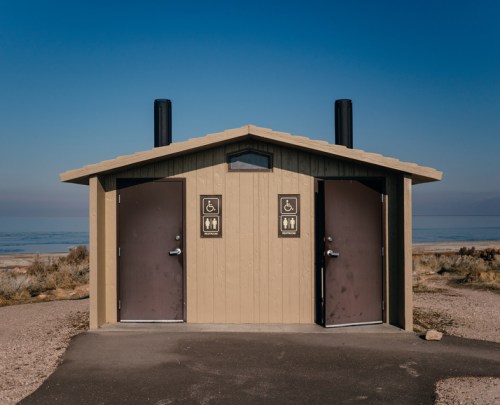Why You’re More Likely To Get Diarrhea in the Summertime—And How To Prevent It From Happening Again
Summer diarrhea can be the result of IBS being triggered by hot weather. But here's what to know, about needing to go.

When it’s sweltering hot outside, the last thing you really want to be doing is running around trying to find a bathroom because you feel (ahem) intense urges about to take over. And no, it isn’t just you—summer diarrhea is a real thing, and it’s relatively common. If you’re curious about why hot weather can sometimes trigger diarrhea and what to do when that happens, you’ve come to the right place.
Experts in This Article
registered dietitian nutritionist and founder of Gutivate
Lindsay Wengler is a Registered Dietitian Nutritionist and Certified Nutrition Support Clinician specializing in eating disorders. She holds a Bachelor of Arts degree in Liberal Arts from Evergreen State College where she focused her studies on music and business management. After years of independent study focused on eating disorders and nutrition, she went back to school to become a dietitian to aid others in their eating disorder recovery. She went on to receive her Bachelor of Science in Nutrition and Dietetics, graduating with honors from San Francisco State University, and then later graduated with her Master’s Degree in Clinical Nutrition. Lindsay completed her internship and fellowship in New York City at NewYork-Presbyterian Hospital where she provided nutrition care for nearly 7 years.
What causes summer diarrhea
Believe it or not, the concept of “summer diarrhea” was actually much worse about a century ago. For example, according to a 2020 study published in the journal Explorations in Economic History, the instance of deadly, viral, and bacterial illness known as “summer diarrhea” what exceptionally common between the years 1910 to 1930. These cases were most deadly to children and eventually waned in presence as, the journal speculates, water purification and food safety measures became more robust.
That being said, summer diarrhea continues to be a problem around the world, according to the Journal of Clinical and Medical Images. Researchers explain that the causes of a lot of these diseases are not entirely understood, but it is speculated in the aforementioned article that the conditions of the summer months potentially correlate with what pathogens can survive and spread.
Even though there aren’t such significant and dangerous cases of summer diarrhea presently in the U.S. as there were in the early 1900s, there is still a connection between hot weather and bathroom trouble. “When your body is faced with high heat and humidity, it can go into a stressed state to try and regulate back to your core temperature,” says registered dietitian and digestive health nutrition specialist Erin Lisemby Judge, RDN, owner and founder of Gutivate. “For some, this “heat stress” may not lead to problems, but for those who are already susceptible to symptoms—like those with IBS—this stress can cause symptoms like bloating, pain, and diarrhea.” IBS can be a common reason why you’re getting diarrhea every day but you’re not sick.
Some people also have what is called thermal hypersensitivity, Judge says, which makes them more sensitive to increased heat and changes in core body temperature, which can lead to more discomfort and symptom flare-ups. This was studied in the World Journal of Gastroenterology in 2009, where researchers founder a significant relationship between pain thresholds, IBS triggers, and higher temperatures.
What people who are prone to getting diarrhea triggered by heat can do
While the early concept of summer diarrhea was much more urgent and dangerous—requiring medication and treatment—any bout of diarrhea can be cause for concern. According to Lindsay Wengler, MS, RD, CNSC of Olive Branch Nutrition, if diarrhea does not improve within a few days, it is important to seek medical attention, as it could signal a serious illness such as food poisoning. “To reduce instances of foodborne illness, do not consume food that has been left out of refrigeration for longer than two hours, cook meat thoroughly, and make sure to wash your hands before preparing or consuming food,” says Wengler.
If you suspect you may have an illness that is causing your digestive discomfort, the Mayo Clinic recommends you seek medical treatment or emergency medical treatment, especially if you exhibit signs of severe dehydration.
And for folks with the aforementioned IBS trigger, Judge recommends trying to cool your core body temperature down as much as possible. This could look like taking a break in the AC, hydrating, resting in the shade, or taking a break from your workout. All of the above might be necessary, too. “Using cooling towels, rinsing your neck and wrists with cold water, exposing yourself to fans, and any forms of shade will help decrease heat stress to prevent the reaction in your gut,” Judge says.
It may also be helpful to know that hotter weather can make some more susceptible to a range of digestive issues, so you may want to avoid other triggers on days you will be in the heat. Other common triggers of diarrhea include alcohol, spicy foods, high-fat meals, and large amounts of high-fiber foods.
Keep in mind that hydration is super important
One more important thing to remember is that hot weather and diarrhea both cause dehydration separately. Judge explains that when these two things are paired together, you can get dehydrated really fast. This means that you need to make sure you’re getting enough water and electrolytes back into your system. Packing electrolyte tablets and a water bottle on hot days can help prevent major dehydration in the event that your IBS or a bout of diarrhea is triggered.










